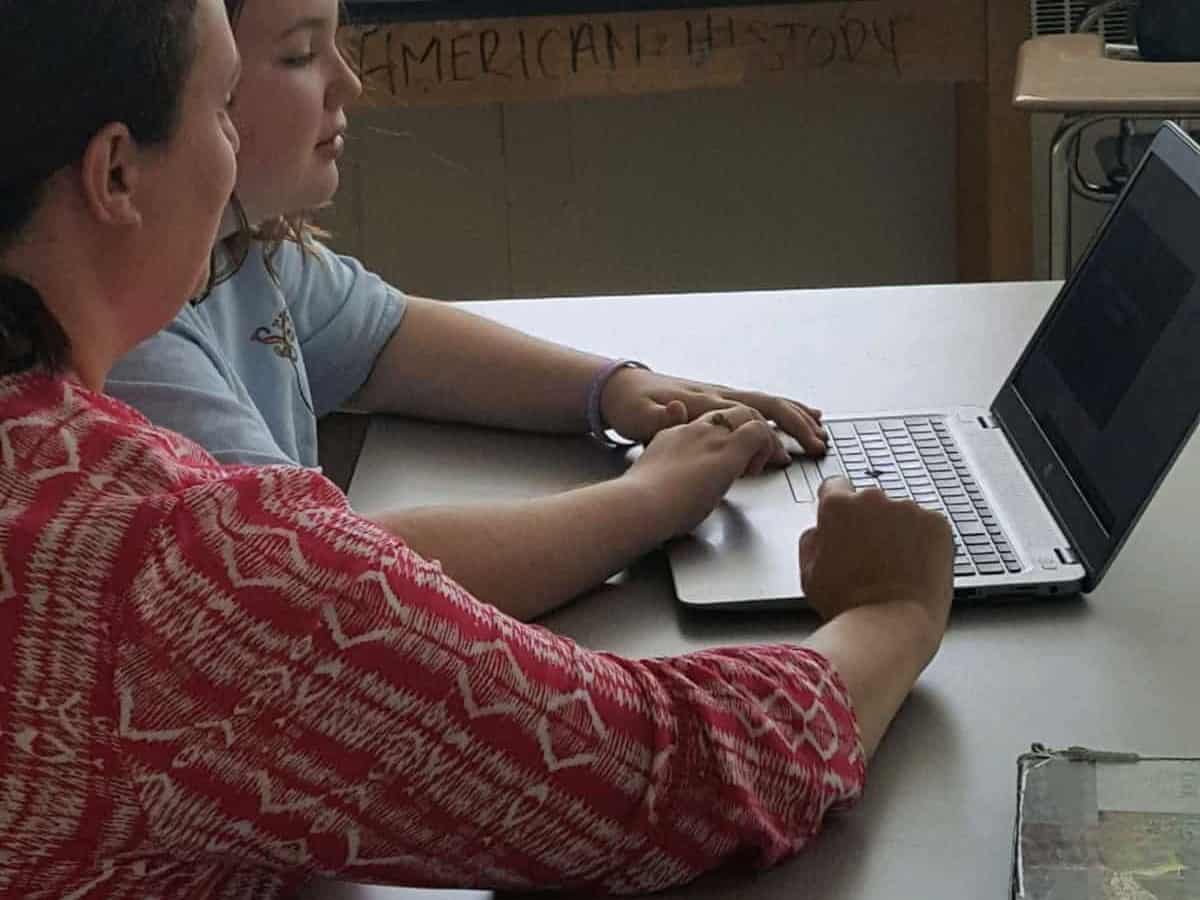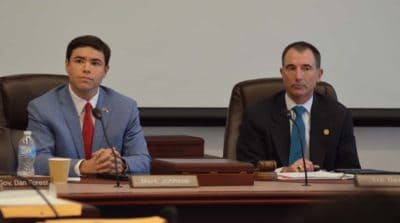
Kristen Tackett spent eight years as a teacher before she decided that her path might lie somewhere else. After becoming a career development coordinator in her district, she realized she really wanted to help students figure out their own path in life.
She found the perfect opportunity to pursue her passion — while helping students figure out their own — by becoming a career coach serving Cape Fear Community College.
Now, she splits her time between Laney and New Hanover high schools in New Hanover County. Counselors or teachers refer students to her, and sometimes she just grabs students she sees who need help.
She helps them do career research, identify their interests and, if they want, join the dual enrollment program. That’s the program that enrolls students in community college while they’re still taking high school classes. And while she loves helping students plan, what she really enjoys is working with students one on one to find opportunities they didn’t know were possible.
“I think our role … it’s really definitely important,” she said. “I can’t think of an adjective to explain how important it is.”
The North Carolina Career Coach Program puts career coaches in high schools, and sometimes middle schools, to help students figure out their career goals and whether community college programs exist that can help students achieve those goals.
As the community college system struggles with enrollment, career coaches are vital in helping students see community college as a viable choice and not just the second option after traditional four-year universities, community college leaders say.
North Carolina had 63 career coaches in the 2018-19 school year, according to a recent annual report to the Joint Legislative Education Oversight Committee of the General Assembly.
The program, which started in 2015, appears to be having an impact. According to the report, enrollment in a variety of high-school-connected community college programs went up 16 percent in the fall 2018 semester and 33 percent in spring 2019.
Jim Morton, president of Cape Fear Community College, has seen the effects on his campus. The college has three career coaches serving New Hanover and Pender counties. The percentage of students entering the Career and College Promise program has gone up 74 percent. Morton said that amounted to about 800 more students, and his team attributes much of that to career coaches.
The Career and College Promise program allows high school students to pursue community college credits toward a certificate or diploma, free of tuition, while in high school.
“Not only are we seeing an increase in the enrolled students, but we are hoping for better outcomes later on,” said Joanne Ceres, vice president for Student Services and Enrollment Management at Cape Fear Community College.
The state funds the career coach program but requires matching funds from community colleges — dollar for dollar.
The funding jumped from $500,000 in the first year to $2.8 million in each of the last two school years. But under the new state budget, which still hasn’t been enacted, the funding is set to increase even more — to about $4.5 million total in 2019-20 and $4.9 million in 2020-21. Also in that budget, the matching requirement would change so that the amount a college had to pay would depend on the economic tier of its home county.
The General Assembly did pass the budget, but Democratic Gov. Roy Cooper vetoed it, and legislative Republicans and the governor have been in a stalemate ever since. This week, Senate President Pro Tempore Phil Berger, R-Rockingham, said the General Assembly is poised to take up a standalone bill soon that would address the community college funding provisions in the budget, but it’s not clear what will be in that bill.
Meanwhile, community college presidents across the state are waiting for a resolution so they can ramp up their career coach programs.
Morton said he hopes to get at least one more coach in his area.
“I think it’s critically important, especially for us,” he said, adding that he hopes the college can expand enrollment enough that the college can just hire career coaches on its own without the grant provided by the state.
Laura Leatherwood, president of Blue Ridge Community College, said the career coach program is one of the most important tools for community colleges.
“The career coach program is the most significant workforce development strategy that has been supported in a long time in terms of developing a workforce pipeline for our communities,” she said. “At Blue Ridge Community College we enjoy great support from our public school partners, and they have embraced our career coaches. So this program is a win-win for all of us.”
Her school has three career coaches serving high schools in Transylvania and Henderson counties.
Algie Gatewood, president of Alamance Community College, said the program is particularly important given the relative lack of knowledge about, and emphasis on, community colleges as a viable option for students. Having someone from the community college that students can connect with makes the students more likely to give community college an honest look.
“I think it’s imperative in terms of its importance,” he said. “This is a modest investment for a huge return. When you think about the cost of a career coach, and the return on that investment in terms of the student making his or her way through high school … I think it’s helping to get some students through school. It gives them something to look forward to.”
Tackett said her advising work isn’t limited to community college options. If a student is interested in a traditional college route, she will help that student figure out the best path forward. But she has an obvious bias toward community colleges.
“We would love for everybody to go to community college because it’s just a great opportunity to get a head start,” she said.
One of her students, Meghan Ford, a senior at New Hanover High School, is weighing her options. She wants to go to Appalachian State University, but the big question is whether she will go straight there or do her first two years at Cape Fear.
She started working with Tackett because she was interested in doing dual enrollment and getting a head start on college work.
Working with the career coach program was eye-opening and cost-effective, she said.
“At the different meetings that I attended, there were a bunch of opportunities that I had no idea about,” she said, adding later: “It’s easy to apply, there isn’t a tuition, and most of it is fairly cheap and affordable for us. It was definitely the right thing for me to do.”
Tackett said the career coach program sometimes can completely change the way high school students think about accomplishing their goals.
“A lot of students who weren’t thinking that they were going to start off at community college start off in this dual enrollment program and realize they have a great education here,” she said.
She said most students are told that they should go to a four-year university. But working with a career coach shows them that’s not the only choice.
“The more that career coaches will be in schools … the students will realize they could go to a two-year school or even a continuing education program and earn just as much money and a great living,” she said.
Correction: This article originally stated the incorrect high school for Meghan Ford. She attends New Hanover High School.

